There is an evident lapse in my understanding on concurrent development in Rust unfortunately. This question stems from weeks repeated struggles to solve a seemingly "trivial" problem.
Problem Domain
Developing a Rust library, named twistrs that is a domain name permutation and enumeration library. The aim and objective of the library, is to be provide a root domain (e.g. google.com) and generate permutations of that domain (e.g. guugle.com) and enrichment that permutation (e.g. it resolves to 123.123.123.123).
One of its objectives, is to perform substantially faster than its Python counterpart. Most notably, network calls such as, but not limited to, DNS lookups.
Currently Design Proposal
The idea behind the library (apart from being a learning ground) is to develop a very trivial security library that can be implemented to meet various requirements. You (as a client) can choose to interact directly to the permutation or enrichment modules internally, or use the library provided async/concurrent implementation.
Note that there is no shared state internally. This is probably very inefficient, but somewhat meaningless for the time being as it prevents a lot of issues.
Current Problem
Internally the DNS lookup is done synchronously and blocks by nature. I'm having trouble turning this into concurrent code. The closest I could get was to use tokio mpsc channels, and perform spawn a single tokio task:
use twistrs::enrich::{Result, DomainMetadata};
use twistrs::permutate::Domain;
use tokio::sync::mpsc;
#[tokio::main]
async fn main() {
let domain = Domain::new("google.com").unwrap();
let _permutations = domain.all().unwrap().collect::<Vec<String>>();
let (mut tx, mut rx) = mpsc::channel(1000);
tokio::spawn(async move {
for (i, v) in _permutations.into_iter().enumerate() {
let domain_metadata = DomainMetadata::new(v.clone());
let dns_resolution = domain_metadata.dns_resolvable();
if let Err(_) = tx.send((i, dns_resolution)).await {
println!("receiver dropped");
return;
}
}
});
while let Some(i) = rx.recv().await {
println!("got: {:?}", i);
}
}
That said, an astute reader will immediately notice that this blocks, and effectively runs the DNS lookups synchronously either way.
Trying to spawn a Tokio task within the for-loop is not possible, due to move being done on the tx (and tx not impl Copy):
for (i, v) in _permutations.into_iter().enumerate() {
tokio::spawn(async move {
let domain_metadata = DomainMetadata::new(v.clone());
let dns_resolution = domain_metadata.dns_resolvable();
if let Err(_) = tx.send((i, dns_resolution)).await {
println!("receiver dropped");
return;
}
});
}
Removing the await ofcourse will result in nothing happening, as the spawned task needs to be polled. How would I effectively wrap all those synchronous calls into async tasks, that can run independently and eventually converge into a collection?
A similar Rust project I came across was batch_resolve, which does a tremendous job at this (!). However, I found the implementation to be exceptionally complicated for what I'm looking to achieve (maybe I'm wrong). Any help or insight to achieve this is greatly appreciated.
If you want a quick way to reproduce this, you can simply clone the project and update the examples/twistrs-cli/main.rs using the first code snippet in this post.
